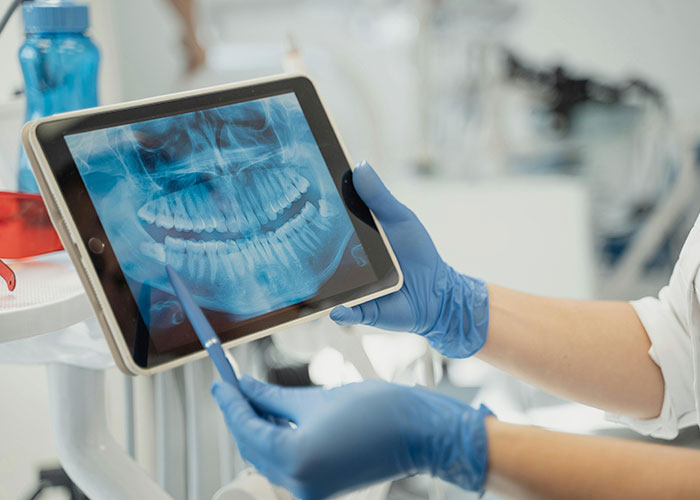Dental Care: Managing Common Oral Health Problems for Seniors

Maintaining good oral health is important at every age. Your teeth and gums play an integral part not just in your general health, but in your quality of life as well. Regular dental care can reduce the risk of harmful bacteria and infections in your mouth and enable you to continue eating foods you enjoy and speaking comfortably.
Here are some common conditions that seniors may be faced with and ways that you can help manage them.
Table of Contents
Xerostomia (Dry Mouth)
Your body naturally produces saliva that keeps your mouth moist and helps remove food particles as you swallow. But as you age, this saliva production can slow down leaving your mouth feeling dry. Certain medications can cause dry mouth as well. In turn, this can allow plaque and bacteria to build up on your teeth more easily and increase the risk of cavities and gum disease.
Drinking water throughout the day, even small sips, can add moisture to your mouth. Try to avoid too much caffeine or alcohol which can have a dehydrating effect. You can also chew sugar-free gum or suck on sugar-free candy to help stimulate increased saliva production. When selecting mouthwash, choose an alcohol-free formulation or a product designed specifically for dry mouth.
Tooth Decay
Cavities are another issue that many seniors deal with, and this can be related to dry mouth. There is not enough moisture in your mouth to keep bacteria at bay and get rid of food particles that cling to your teeth. Poor brushing or flossing habits can also be a contributing factor.
Make sure you’re brushing and flossing your teeth at least twice a day. Using an electric toothbrush can remove plaque more effectively and be easier to handle than a manual toothbrush. Decreasing the amount of sugary or acidic foods you eat can help as well. Drinking water with your meal can help keep these foods from sticking to your teeth, but you still want to thoroughly brush as well.
Gum Disease
It’s not just your teeth you need to care for – pay attention to your gums, too. If your gums are inflamed, red, or bleed easily, that can be a sign of gum disease or periodontal disease. Another sign can be a receding gum line.
As you brush, make sure you’re focused on the area where your teeth and gums meet. You want to keep plaque and bacteria from going below the gum line. Rinsing with mouthwash can also reduce potentially harmful germs and bacteria.
Tooth Loss
If left untreated, tooth decay and gum disease can lead to tooth loss. Infections around the root of your teeth can contribute as well. Missing teeth can be uncomfortable, interfere with your speech, and make it more difficult to eat foods you enjoy.
If you do have missing teeth, replacing them with bridges, partials, dentures, or dental implants can help restore your oral function. They can also keep remaining teeth from shifting out of place and causing further discomfort or damage.
Denture-Related Problems
Dentures require regular care as well. They need to be cleaned daily and periodically refit. Your gums can shrink, and bone can resorb changing how your dentures fit. This can lead to rubbing, sore spots, and difficulty keeping your dentures in place.
Schedule regular dental appointments to have your dentures checked along with your gums and the rest of your mouth. Your dentist can work with you to correct ill-fitting dentures so you can get back to eating and speaking more comfortably and confidently.
Caring for Your Oral Health
You should see your dentist every six months for regular checkups and cleanings, and more often if you’re experiencing problems. Make daily brushing and flossing part of your routine, and if you have trouble doing these activities on your own, work with an in-home caregiver who can assist. A caregiver can also remind you of upcoming appointments and work with you to adjust your diet based on your oral health.
Contact Always Best Care at 877-318-0529 to learn more about the benefits of in-home care and to schedule a free consultation!





